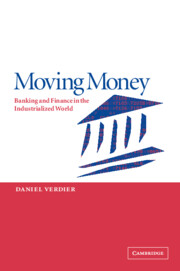Book contents
- Frontmatter
- Contents
- List of figures
- List of tables
- Preface and acknowledgements
- Introduction
- Part I Theoretical conjectures on banking, finance, and politics
- 1 Capital scarcity, capital mobility, and information asymmetry: a survey
- 2 The institutions of capital mobility
- Part II The first expansion (1850–1913)
- Part III The second expansion (1960–2000)
- Appendixes
- Bibliography
- Citations index
- Subject index
2 - The institutions of capital mobility
Published online by Cambridge University Press: 22 September 2009
- Frontmatter
- Contents
- List of figures
- List of tables
- Preface and acknowledgements
- Introduction
- Part I Theoretical conjectures on banking, finance, and politics
- 1 Capital scarcity, capital mobility, and information asymmetry: a survey
- 2 The institutions of capital mobility
- Part II The first expansion (1850–1913)
- Part III The second expansion (1960–2000)
- Appendixes
- Bibliography
- Citations index
- Subject index
Summary
Lombard Street is the great go-between.
Bagehot 1991, p. 5.The argument of this book is that a freely functioning financial sector can split an economy's financial geography into a center and a periphery, redistributing income from location-specific factors in the periphery to those in the core. It may thereby modify the fiscal apportionment between local and central governments, and thus the very makeup of the state. Consequently, and in anticipation of this occurrence, the financial market elicits political resistance and incurs regulatory curbs in countries that are not fully centralized.
Consider an economy featuring a financial sector distinct from non-financial sectors. The financial sector raises capital (the factor) to make finance (the product). Capital is an input that is specific to the financial sector, but it is not location-specific, at least not to the same extent as labor, machinery, or skills are, but instead easily moves around. A financial product, in contrast, is the output of the financial sector. This output is used as input by non-financial firms (in the form of loans and underwriting) and financial firms – banks are the largest consumers of day-to-day loans, bond issues, and derivatives. The output is also consumed by final consumers in the form of mortgages and credit for consumption.
Unlike capital, financial products are not necessarily free to move around, but see their geographic mobility hampered by information asymmetry – the fact that investors cannot trust borrowers to tell them the truth about the profitability of their investment.
- Type
- Chapter
- Information
- Moving MoneyBanking and Finance in the Industrialized World, pp. 19 - 36Publisher: Cambridge University PressPrint publication year: 2003

